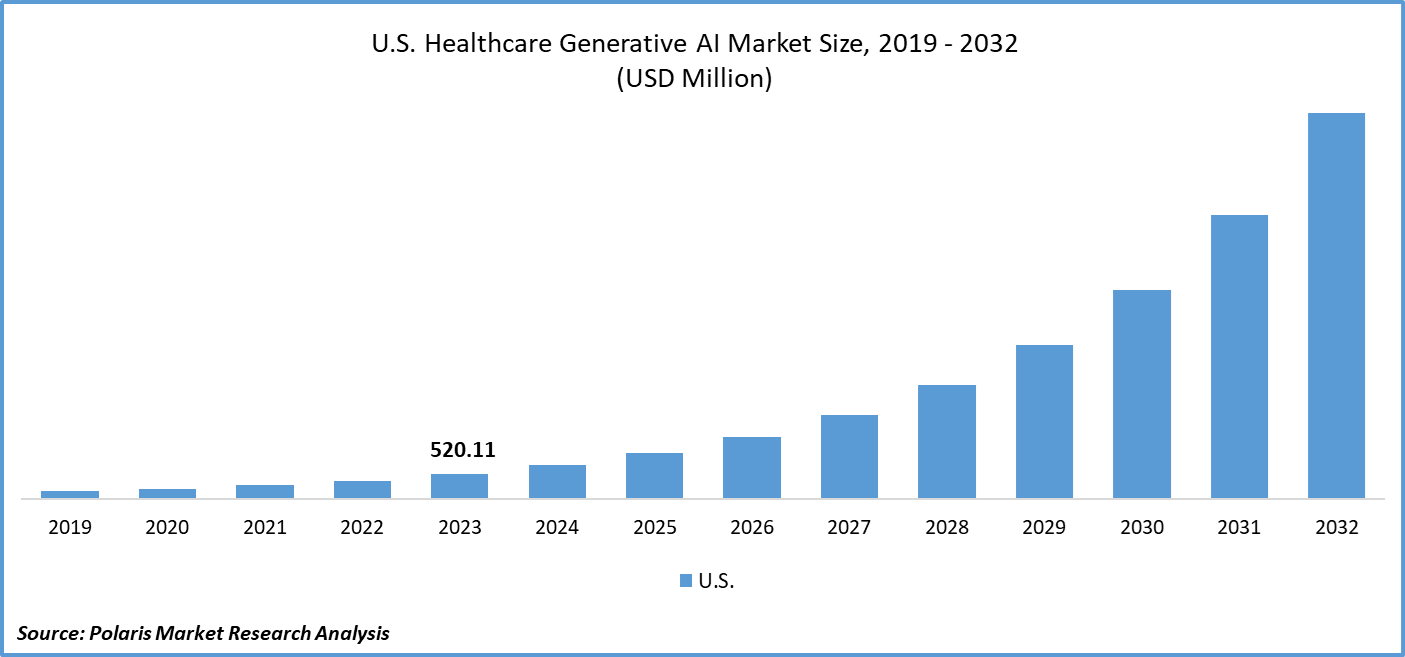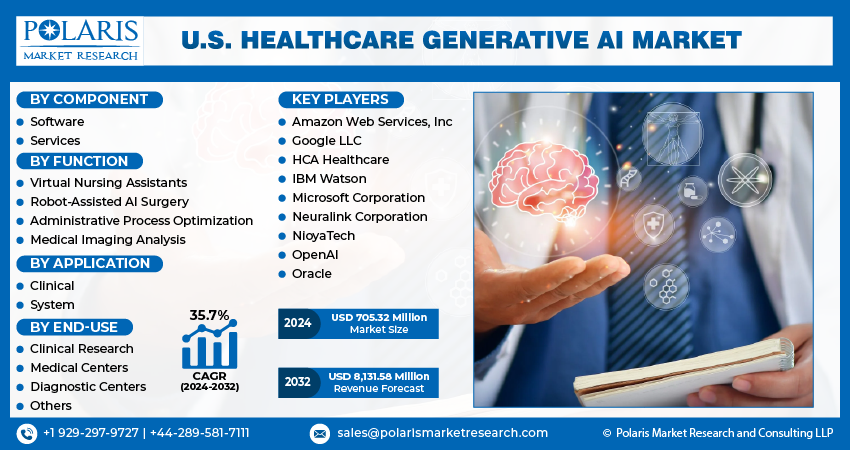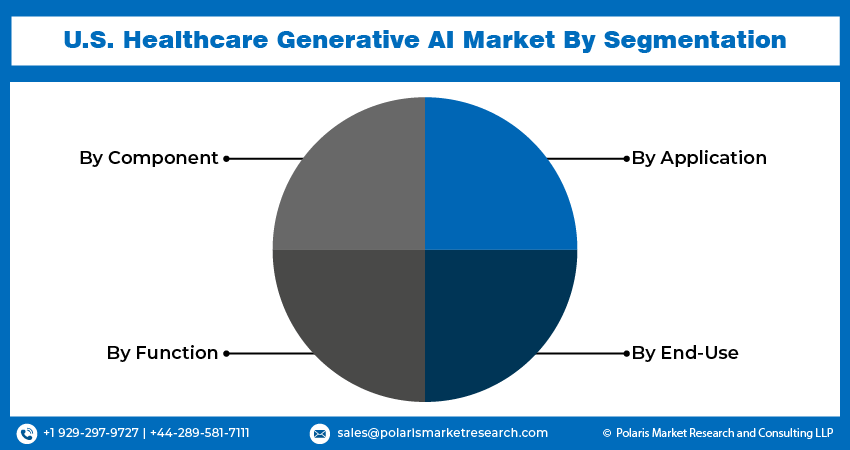
U.S. Healthcare Generative AI Market Share, Size, Trends, Industry Analysis Report
By Component (Software and Services); By Function; By Application; By End-Use; Segment Forecast, 2024- 2032
- Published Date:Mar-2024
- Pages: 119
- Format: PDF
- Report ID: PM4816
- Base Year: 2023
- Historical Data: 2019-2022
Report Outlook
The U.S. healthcare generative ai market size was valued at USD 520.11 million in 2023. The market is anticipated to grow from USD 705.32 million in 2024 to USD 8,131.58 million by 2032, exhibiting a CAGR of 35.7% during the forecast period.
Industry Trend
The advent of Gen AI marks a paradigm shifts in healthcare and life sciences, profoundly altering patient care and research landscapes. Gen AI's sophisticated features are reshaping diagnostics, treatment strategies, and drug development methodologies. Through seamless integration, artificial intelligence is driving the creation of tailored and streamlined healthcare interventions, optimizing resource utilization and elevating patient results. Healthcare professionals and researchers in life sciences are harnessing the power of Gen AI to extract invaluable insights from expansive data repositories, catalyzing rapid advancements and pioneering innovations. Delve into the transformative influence of Gen AI within healthcare and life sciences, fostering personalized care and propelling research endeavors to unprecedented heights.

To Understand More About this Research:Request a Free Sample Report
The U.S. Healthcare Generative AI market encompasses a broad range of applications and opportunities within the healthcare sector. This burgeoning market involves the utilization of generative artificial intelligence (AI) technologies to enhance various aspects of healthcare delivery, including diagnostics, treatment planning, drug discovery, patient monitoring, and administrative processes.
The partnership landscape within the U.S. Healthcare Generative AI market is characterized by dynamic collaborations between technology firms, healthcare providers, research institutions, and pharmaceutical companies. Companies are forming strategic alliances with healthcare organizations to develop and implement generative AI solutions for various healthcare applications. These partnerships often involve joint research initiatives, co-development of AI algorithms, and the integration of AI-driven systems into existing healthcare infrastructure. Additionally, pharmaceutical companies are partnering with AI startups and research institutions to leverage generative AI for drug discovery and development, aiming to accelerate the pace of innovation and bring new therapies to market more efficiently.
- For instance, in September 2023, Microsoft Corp. and Mercy forged a partnership to leverage generative AI alongside other digital innovations to elevate both patient care and experience. This collaboration signifies a notable transition within healthcare, emphasizing the increasing adoption of cutting-edge digital technologies for delivering consumer-centric care.
Generative Adversarial Networks (GANs) are widely used to create realistic images and videos. This includes generating photorealistic images of non-existent objects or scenes. Moreover, Generative AI is increasingly being used in drug discovery and molecular design. By generating novel molecular structures and predicting their properties, generative models help identify potential drug candidates and accelerate the drug discovery process.

Key Takeaway
- By end use category, the clinical research segment accounted for the largest market share in 2023.
- By application category, the clinical segment is projected to grow at a high CAGR during the projected period.
What are the market drivers driving the demand for the U.S. Healthcare Generative AI Market?
Growing Healthcare Costs have been projected to spur product demand.
The increasing cost of healthcare delivery is a significant concern, particularly in the United States, where healthcare spending far exceeds that of other developed nations. This rise in costs can be attributed to various factors, including advances in medical technology, an aging population, increased prevalence of chronic diseases, administrative complexities, and inefficiencies in healthcare delivery. Generative AI algorithms can streamline various healthcare processes, automating repetitive tasks such as administrative work, appointment scheduling, and billing. By reducing the administrative burden on healthcare providers, staff can allocate more time to direct patient care, improving efficiency and reducing operational costs.
Generative AI algorithms are increasingly being used to improve diagnostic accuracy and treatment planning. By analyzing medical imaging data, patient records, and genetic information, AI-powered systems can assist healthcare providers in making more informed decisions, reducing the likelihood of diagnostic errors and unnecessary treatments. This not only improves patient outcomes but also helps avoid costly complications and readmissions.
Which factor is restraining the demand for U.S. Healthcare Generative AI?
Data Privacy and Security Concerns is expected to hinder the growth of the market.
The use of generative AI in healthcare involves the analysis and processing of sensitive patient data, including medical records, imaging scans, and genetic information. Concerns about data privacy, security breaches, and compliance with regulations such as HIPAA (Health Insurance Portability and Accountability Act) can hinder the adoption of generative AI solutions. Healthcare organizations and patients may be hesitant to fully embrace AI technologies due to fears of data misuse, unauthorized access, or breaches of confidentiality. Addressing these concerns and ensuring robust data privacy and security measures will be crucial to fostering trust and encouraging wider adoption of generative AI in healthcare.
Report Segmentation
The market is primarily segmented based on component, function, application and end-use.
|
By Component |
By Function |
By Application |
By End-Use |
|
|
|
|
To Understand the Scope of this Report:Speak to Analyst
Category Wise Insights
By End-Use Insights
Based on the end-use analysis, the market is segmented into clinical research, medical centers, diagnostic centers, and others. The clinical research segment held the largest market share in 2023. Clinical research stands as a cornerstone in the healthcare industry's transition toward precision medicine, which aims to customize medical treatments and interventions to each patient's unique needs. Generative A.I. plays a pivotal role in this paradigm shift by analyzing extensive patient data, encompassing genetic information, medical histories, and imaging data, to discern patterns and forecast personalized treatment outcomes.
Moreover, clinical research serves as an indispensable component in the journey of drug discovery and development. Generative A.I. technologies are increasingly employed to streamline this intricate process. These technologies aid in identifying potential drug candidates, forecasting their effectiveness and safety profiles, and optimizing the design of clinical trials. Through the utilization of Generative A.I., researchers can expedite the development of innovative therapies and bring them to market with greater efficiency.
Furthermore, Generative A.I. facilitates the development of personalized healthcare interventions by generating tailored treatment plans and recommendations tailored to each patient's characteristics and needs.
By Application Insights
Based on function analysis, the market has been segmented on the basis of clinical and system. The clinical segment is expected to witness the fastest-growing CAGR during the forecast period. Generative A.I. is increasingly being integrated into clinical decision support systems to assist healthcare providers in making more accurate and informed decisions regarding patient care. These AI-powered systems can analyze vast amounts of patient data, identify patterns, and generate insights that aid in diagnosis, treatment planning, and personalized care pathways. The demand for such advanced clinical decision support tools is driving the growth of the clinical segment in the U.S. Healthcare Generative AI Market.
Furthermore, the continuous advancements in medical technology, including imaging techniques, laboratory diagnostics, and molecular testing methods, are enhancing the accuracy and efficiency of the disease diagnosis segment. These technological innovations enable earlier detection and more precise identification of diseases, driving growth in the diagnosis segment.
The global burden of diseases such as cancer, cardiovascular diseases, diabetes, and infectious diseases continues to rise due to various factors, including aging populations, lifestyle changes, and environmental factors. As a result, there is an increasing demand for accurate and timely disease diagnosis to facilitate prompt treatment and management.

Competitive Landscape
The competitive landscape of the U.S. Healthcare Generative AI Market is characterized by a dynamic interplay among numerous players striving for market dominance. These industry giants leverage their extensive resources, research capabilities, and technical expertise to innovate and introduce cutting-edge A.I. technologies aimed at revolutionizing healthcare delivery. Alongside established technology firms, a multitude of startups and emerging players are making significant strides in the healthcare-generative A.I. space. Furthermore, partnerships and collaborations between technology companies, healthcare providers, and research institutions are commonplace, fostering cross-industry synergies and accelerating the adoption of Generative A.I. in healthcare settings.
Some of the major players operating in the U.S. market include:
- Amazon Web Services, Inc
- Google LLC
- HCA Healthcare
- IBM Watson
- Microsoft Corporation
- Neuralink Corporation
- NioyaTech
- OpenAI
- Oracle
Recent Developments
- In January 2024, Nuance Communications, in collaboration with Epic Systems Corporation, unveiled DAX Copilot (DAX), a cutting-edge AI-driven tool designed to integrate with Epic's EHR system seamlessly. DAX streamlines clinical documentation processes, facilitates easier access to patient data during exams, and ultimately elevates healthcare outcomes through enhanced efficiency and accuracy.
- In December 2023, Google launched MedLM, a suite of foundational AI models tailored specifically for healthcare applications. These advanced models are now accessible to Google Cloud customers in the United States via the Vertex AI platform.
Report Coverage
The U.S. Healthcare Generative AI Market report emphasizes on key country across the globe to provide better understanding of the product to the users. Also, the report provides market insights into recent developments, trends and analyzes the technologies that are gaining traction around the globe. Furthermore, the report covers in-depth qualitative analysis pertaining to various paradigm shifts associated with the transformation of these solutions.
The report provides detailed analysis of the market while focusing on various key aspects such as competitive analysis component, function, application and end-use., and their futuristic growth opportunities.
U.S. Healthcare Generative AI Market Report Scope
|
Report Attributes |
Details |
|
Market size value in 2024 |
USD 705.32 Million |
|
Revenue forecast in 2032 |
USD 8,131.58 Million |
|
CAGR |
35.7% from 2024 – 2032 |
|
Base year |
2023 |
|
Historical data |
2019 – 2022 |
|
Forecast period |
2024 – 2032 |
|
Quantitative units |
Revenue in USD million/billion and CAGR from 2024 to 2032 |
|
Segments covered |
By Component, By Function, By Application, By End-Use |
|
Customization |
Report customization as per your requirements with respect to countries, country and segmentation. |
FAQ's
key companies in U.S. Healthcare Generative AI Market are Amazon Web Services, Inc, Google LLC, HCA Healthcare, IBM Watson
The U.S. Healthcare Generative AI Market exhibiting a CAGR of 35.7% during the forecast period.
The U.S. Healthcare Generative AI Market report covering key segments are component, function, application and end-use.
key driving factors in U.S. Healthcare Generative AI Market are rising incidence of chronic conditions among patients
The U.S. healthcare generative AI market size is expected to reach USD 8,131.58 million by 2032
